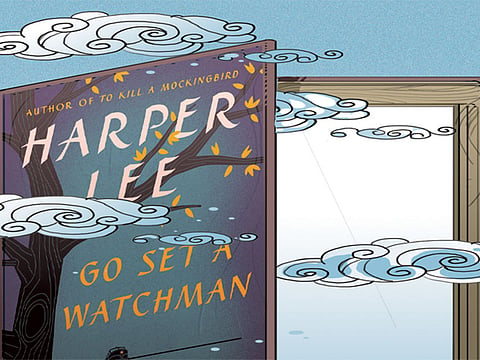First lines still matter
Whether a book is found on a shelf or on a screen, a great first sentence can draw us swiftly into the author’s world. That’s how Lee’s new novel hooked me from the start

Harper Lee will not need a great first line to sell a gazillion copies of Go Set a Watchman, her old-new novel that was set for publication on Tuesday. But she has written one anyway: “Since Atlanta, she had looked out the dining-car window with a delight almost physical.”
Note what the author already accomplished, even for those of us not primed by our love for To Kill a Mockingbird to discover the further adventures of Jean Louise ‘Scout’ Finch. With a single smooth sentence, Lee has set her readers in motion, on a train, rocking our way across Georgia in the company of the protagonist. She has us eager to read on, if only to discover what exactly the heroine is so happy about — and to await the inevitable dashing of her hopes. (In fiction hopes are always dashed, sometimes — as Scout knows — permanently.)
I am glad the book starts so well. Go Set a Watchman comes along at an auspicious moment for fiction. The market for serious novels is a mess. Young-adult fiction continues to boom, but reports of rising book sales in 2014 masked a 2 per cent decline in sales of adult fiction, the traditional hallmark of serious publishing. Even the famous August peak, when people buy books they plan to read on vacation, continues to shrink.
A great first line used to be a crucial tool for selling fiction. The reader would happen upon an unknown book and the opening would draw her in. In today’s fiction marketplace, dominated by Amazon and e-readers, it is tough to sell a book on the quality of the writing. Big names matter. Genre matters. Browsing in stores is a smaller piece of the market. But readers can still admire the craft that goes into a great beginning. The very best first lines will work in any medium. (I mean that literally. I read the opening chapter of Go Set a Watchman when it was posted online last Friday. The first line still worked.)
What do I mean by the very best? Well, forget “Call me Ishmael”, which routinely finishes near the top of lists of brilliant first lines, but is only the best-known — not the best. (Imagine if To Kill a Mockingbird had opened with “Call me Scout” instead of “When he was nearly thirteen, my brother Jem got his arm badly broken at the elbow.”) Consider instead “Out of the air, the ax”. How can a reader not love a first line like that? That is the opening of Joyce Carol Oates’s splendid new thriller, Jack of Spades, and it does exactly the work first lines should: It makes us want to know what happens next.
That is the key. The only purpose of the first sentence is to get us to read the second sentence. If the opening line works, we are likely to give the author a chance to impress us. Consider these three sparkling first lines from three very different novels:
n “The truth is, if old Major Dover hadn’t dropped dead at Taunton races, Jim never would have come to Thursgood’s at all.”
n “Straightening the ruffles on the curtains, she could not forget it.”
n “Two former lovers of Molly Lane stood waiting outside the crematorium chapel with their backs to the February chill.”
Teased by the author’s prose
Each invites the reader immediately into a small, private and very realistic world, hinting that something amazing has just happened or is about to. Already we are worried about what will become of Jim at whatever the mysterious Thursgood’s might turn out to be. We share the pain or maybe panic of the unknown “she” who is unable to forget the unspoken “it” as she sets about trying to force regularity upon her day. And whatever may have befallen poor Molly Lane, we are more than a little concerned about those two former lovers, around whom we can sense the heat of jealous anger about to turn to flame. Picking up these books in a store or library, teased by the author’s prose, it would take an effort not to keep reading, just to discover what brought about the challenges already inherent in the cleverly crafted first line.
If you are browsing, first lines still matter. You cannot stumble upon the opening sentence of Andy Weir’s surprise best-seller The Martian without being sucked in. (I daren’t quote it here, as the language is not entirely polite.) Only four words, but devilishly effective. And Weir’s in good company. Some of the greatest first lines in modern fiction are short.
Here’s John Gregory Dunne, The Red White and Blue: “When the trial began, we left the country.”
Here’s Renata Adler, Speedboat: “Nobody died that year.”
And some are very long, as this memorable beginning from John Irving: “I am doomed to remember a boy with a wrecked voice — not because of his voice, or because he was the smallest person I ever knew, or even because he was the instrument of my mother’s death, but because he is the reason I believe in God; I am a Christian because of Owen Meany.” In modern fiction, I’m not sure this one has been topped.
Long or short, whether a book is found on a shelf or on a screen, a great first line can still draw us swiftly into the author’s world. That’s how Lee’s new novel hooked me from the start. I won’t be the only one she reels in.
— Washington Post



